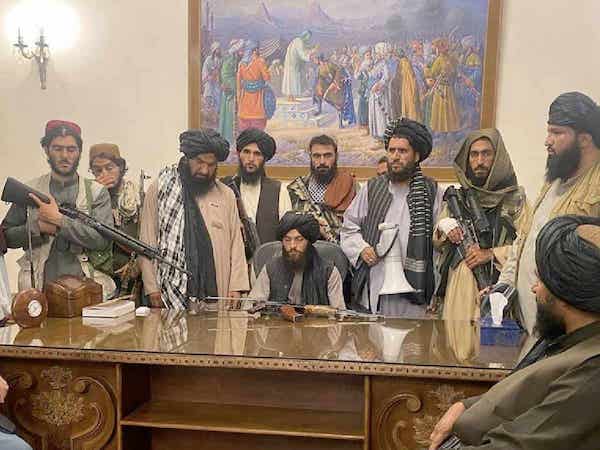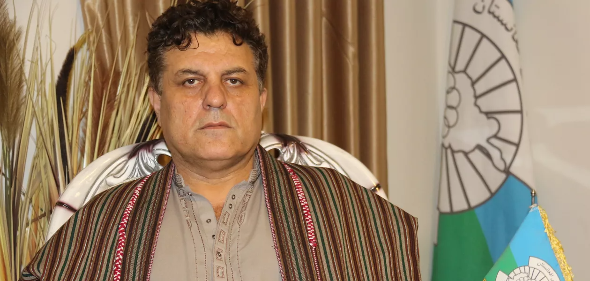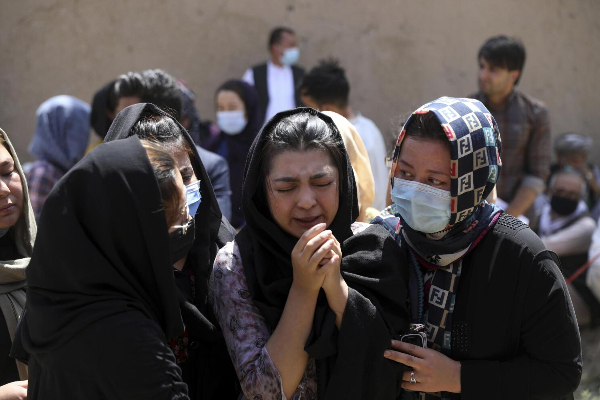The past year will be remembered as a momentous year for Afghanistan and its people, beginning with a fragile peace process and then witnessing the fall of the Western-backed government of Ashraf Ghani.

Taliban forces in the office of the President of Afghanistan/ ©Social Media
The second round of negotiations between the Afghan negotiating team and the Islamic Emirateís Qatar-based political office began in 2021 but both sides failed to reach a political settlement.
The then US special envoy for Afghanistan, Zalmay Khalilzad, made several rounds of regional visits to Kabul, Islamabad, Doha and other regional countries in a bid to provide a roadmap for peace and a transitional government in Afghanistan.
The former Afghan president Ashraf Ghani and his close aides were strongly critical of Khalilzadís advocacy for a transitional government.
The regional players joined in the new game of Afghan war and peace. They started by inviting a delegation of the Islamic Emirate and discussing the current situation and the future.
The chaos finally ended with the fall of the government and the reemergence of the Islamic Emirate government in Afghanistan.
In 2021 there were efforts to bring an enduring peace in Afghanistan that would have included both the republic and Islamic Emirate side, but this is not what happened.
"Peace still remained a hope, we were passed from political structure to political structure--this doesnít provide political, social, economic stability," said Samad Karmand, a political analyst.
The two Afghan sides held several meetings but failed to make any breakthroughs. Both sides criticized the other for the talksí failure.
"The efforts didnít bear a good result due to the pressure of the conflict, and because of certain people in the presidential palace," said Farkhruddin Qarizada, a political analyst.
Khalilzadís meetings with the Afghan leaders in Kabul and regional countries were mainly focused on the formation of an interim government.
Ghani, however, insisted on holding an election or a Loya Jirga (National Assembly) through which he would hand over power to the next administration.
"The transition of power via election is our main principle," Ghani said.
Some sources said that the Islamic Emirate was ready to call a 90-day ceasefire but the negotiations in Doha stalled and did not allow for it.
In March 2021, the US Secretary of State Antony Blinken sent a letter to Ghani and the then chairman of the high council for national reconciliation, Abdullah Abdullah.
"These proposals reflect some of the ideas included in the roadmap for the peace process that (NSA) Mohib shared with Ambassador Ross Wilson," the letter read.
"The documents will enable the Islamic Republic and the Taliban to move urgently to the tasks of developing a)the foundational principles that will guide Afghanistanís future constitutional and governing arrangements, b) a roadmap to a new, inclusive government; and c) the terms of a permanent and comprehensive ceasefire," Blinken wrote in the letter.
The efforts of the high council for national reconciliation could not boast of any significant progress in the Afghan peace process.
Many Afghan leaders were blaming Ghani for being an "obstacle" in the way of the peace process as he attempted to remain in power, but Ghani and his close aides denied it.
According to Mohib, the government was planning to send a negotiating team to Qatar to discuss the transition of power and a peaceful settlement on August 15, the day when Kabul collapsed to the Islamic Emirate.
"Some colleagues and my wife and I were going to the airport to them (our family) in the UAE, and I was going from there to Doha alongside other delegates for negotiations," Mohib said.
Ghani and his close aides fled the country on August 15, leaving the country and the Afghan people facing an uncertain future.
The peace process failed to produce any positive results for the country. The Islamic Emirate took its second turn in power.
Of all the major events, the fall of the republic system-- the formation of which was considered the most important achievement--is the main historic event of 2021 for Afghanistan and its traumatized people.
The fall of the Republic started with overrunning of districts across the country by the Islamic Emirate. The Islamic Emirate forces within weeks stormed into the provincial centers.
2021 was a bloody year for the Afghan nation, with the government and Islamic Emirate forces fighting in battles across the nation to gain leverage at the negotiation table of the ultimately failed peace process.
On May 20, 2021, Dawlat Shah district of Laghman was the first to fall into the hands of the Islamic Emirate forces; this was followed by the rapid fall of districts across the country.
On July 6, 2021, Foreign Minister Mohammad Hanif Atmar confirmed the fall of at least 80 districts. Many of the districts were overrun by the Islamic Emirate as part of the Ghani administrationís "tactical retreat" plan.
"The individuals appointed to military leadership were not experienced with the Afghan war," said ANDSF spokesman Omar Shinwari.
On August 6, 2021, Zaranj, capital of the southwestern province of Nimruz, was the first provincial center to collapse.
Powerful Afghan leaders attempted to use their influence among the people to resist the Islamic Emirate offensives, but they were ultimately unsuccessful.
Marshal Abdul Rashid Dostum, the leader of Hezb-e-Junbish, and Ata Mohammad Noor, leader of a splinter faction of the Jamiat-e-Islami party, traveled to Balkh province to fight the Islamic Emirate forces, but both fled the province and the provincial capital Mazar-e-Sharif collapsed.
"Even if I die, it is an honor for me. We will not abandon this nation," Dostum had previously said.
Within weeks, the Islamic Emirate entirely took control of Afghanistan.
According to the Washington Post, around 4,000 Afghan Security Forces were killed and 1,000 disappeared between May 1 and August 15, 2021.
Based on available statistics, at least 92,000 members of the Republicís security forces lost their lives in combat since 2001.
"This collapse is affecting Afghanistan. The regional countries donít want Afghanistan to have a strong military," said Gen Sadeq Shinwari, a military veteran.
The Resistance Front in Panjshir province fought for a couple of weeks after the fall of Kabul, but the Islamic Emirate eventually claimed that the open resistance in Panjshir had been quelled.
Source: Tolonews
LINK: https://www.ansarpress.com/english/25478
TAGS:






























 Ghani Removed From UN Heads of State List
Ghani Removed From UN Heads of State List 




